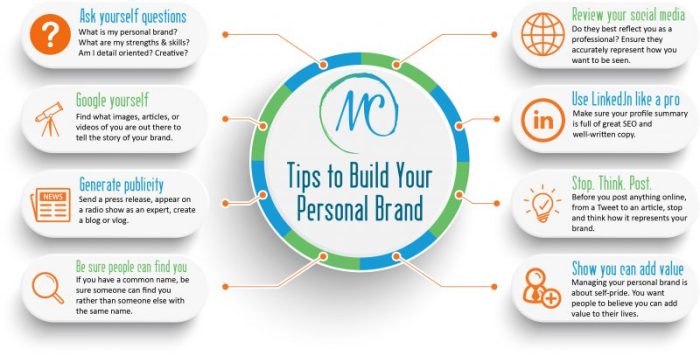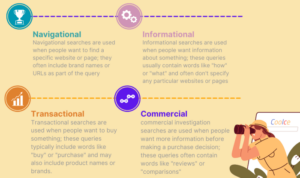Building a Personal Brand kicks off the journey to success, where authenticity and storytelling merge to create a unique identity that stands out in a competitive market. Get ready to dive into the world of personal branding, where social media plays a crucial role in shaping your online presence.
The Importance of Personal Branding
In today’s professional landscape, personal branding plays a crucial role in establishing a unique identity and standing out in a sea of competitors. It allows individuals to showcase their skills, expertise, and values in a way that resonates with their target audience.
Examples of Successful Personal Brands
- Elon Musk: Known for his innovative approach and vision for the future, Musk has built a strong personal brand synonymous with cutting-edge technology and sustainability.
- Oprah Winfrey: With her authenticity and empowerment-focused content, Winfrey has created a personal brand that is synonymous with inspiration and positivity.
- Gary Vaynerchuk: Vaynerchuk has established a personal brand centered around entrepreneurship, hustle, and authenticity, resonating with a younger audience seeking motivation and practical advice.
How Personal Branding Differentiates Individuals, Building a Personal Brand
Personal branding allows individuals to showcase their unique value proposition and establish credibility in their respective fields. By crafting a distinct personal brand, individuals can differentiate themselves from competitors, attract opportunities, and build a loyal following. In a competitive market, a strong personal brand can be the key to unlocking new opportunities and advancing one’s career.
Building Blocks of Personal Branding

Building a strong personal brand involves several key elements that work together to create a unique and authentic identity. These elements include authenticity, consistency, storytelling, and the strategic use of social media.
Authenticity
Authenticity is at the core of a strong personal brand. Being true to yourself, values, and beliefs helps you connect with your audience on a deeper level. Authenticity builds trust and credibility, which are crucial in personal branding.
Consistency
Consistency in your actions, messaging, and visual identity is key to building a strong personal brand. Consistent branding helps you stand out and be easily recognizable to your audience. Whether it’s your tone of voice, color scheme, or content style, maintaining consistency is essential.
Storytelling
Storytelling is a powerful tool in personal branding. Sharing your personal stories, experiences, and journey helps create an emotional connection with your audience. Your stories humanize your brand and make it more relatable and memorable.
Social Media
Social media plays a crucial role in shaping and promoting a personal brand. It allows you to showcase your brand personality, engage with your audience, and reach a wider network. Leveraging different social media platforms strategically can help you increase your visibility and build a strong personal brand online.
Establishing Online Presence

In today’s digital age, having a strong online presence is crucial for building a personal brand and reaching a wider audience. By utilizing various online platforms effectively, individuals can showcase their skills, expertise, and unique qualities to attract opportunities and connections.
Exploring Online Platforms
When it comes to personal branding, there are several online platforms that can be utilized to establish a strong presence. These include:
- LinkedIn: A professional networking platform where individuals can create a detailed profile highlighting their work experience, skills, and accomplishments.
- Personal Websites: Creating a personal website allows individuals to showcase their portfolio, blog about their expertise, and provide a centralized hub for all their online activities.
- Social Media: Platforms like Instagram, Twitter, and Facebook can be used to share updates, connect with followers, and amplify your personal brand through engaging content.
Optimizing Social Media Profiles
To effectively reflect your personal brand on social media, consider the following tips:
- Use a consistent tone and visual style across all platforms to maintain brand coherence.
- Optimize your bio or profile description to clearly communicate your expertise and value proposition.
- Regularly update your profiles with relevant content that showcases your knowledge and personality.
Creating Valuable Content
Creating valuable content is essential for engaging and growing an online audience. Consider the following strategies:
- Identify your target audience and tailor your content to meet their needs and interests.
- Provide informative, entertaining, or inspiring content that adds value to your audience’s lives.
- Engage with your audience through comments, messages, and interactions to build a sense of community around your personal brand.
Networking and Collaboration
Building a personal brand is not just about creating an online presence; it also involves networking and collaboration. Networking is crucial in building a personal brand as it allows individuals to connect with others in their industry, exchange ideas, and gain valuable insights. Collaboration, on the other hand, enables individuals to leverage the audience and expertise of other brands or influencers to amplify their reach and credibility.
Strategies for Forming Meaningful Connections
Forming meaningful connections within one’s industry is essential for building a strong personal brand. Here are some strategies to consider:
- Attend industry events and conferences to meet like-minded professionals.
- Utilize social media platforms to engage with industry leaders and peers.
- Join professional networking groups or associations to expand your network.
- Offer to help others and provide value before asking for anything in return.
Collaborating with Other Brands or Influencers
Collaborating with other brands or influencers can significantly boost your personal brand reach and visibility. Here’s how you can do it:
- Identify brands or influencers that align with your values and target audience.
- Reach out with a clear proposal outlining the benefits of collaboration for both parties.
- Create engaging and mutually beneficial content together, such as joint webinars, podcasts, or social media campaigns.
- Promote the collaboration across all channels to maximize exposure and reach.
Managing Reputation and Feedback: Building A Personal Brand
In the digital age, managing your reputation and responding to feedback are crucial aspects of building a strong personal brand. Your online presence can greatly impact how others perceive you, making it essential to monitor and address any feedback you receive.
Monitoring Online Reputation
- Regularly Google yourself to see what information comes up about you.
- Set up Google Alerts for your name to receive notifications when new content is published.
- Monitor social media platforms and respond promptly to any comments or messages.
Responding to Feedback Professionally
- Always thank individuals for their feedback, whether positive or negative.
- Address negative feedback calmly and professionally, offering solutions or explanations.
- Show empathy and understanding towards the concerns raised by others.
Turning Negative Feedback into Opportunities
- Use negative feedback as a chance to learn and grow, identifying areas for improvement.
- Engage with the individual who provided the feedback to understand their perspective better.
- Implement changes based on the feedback received to enhance your personal brand.





